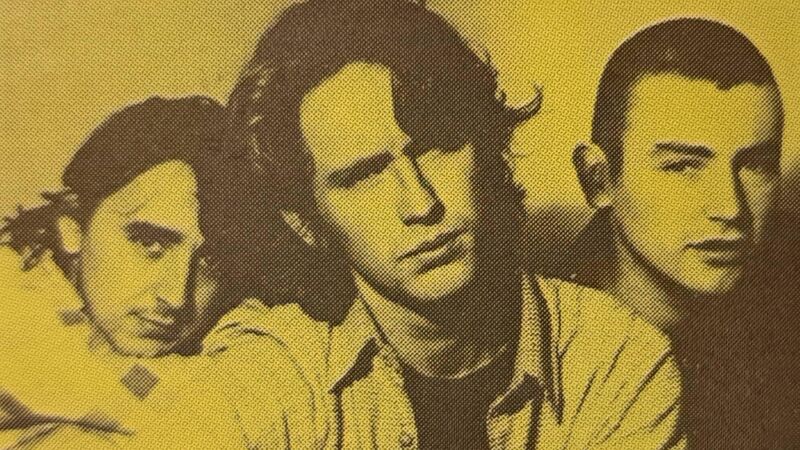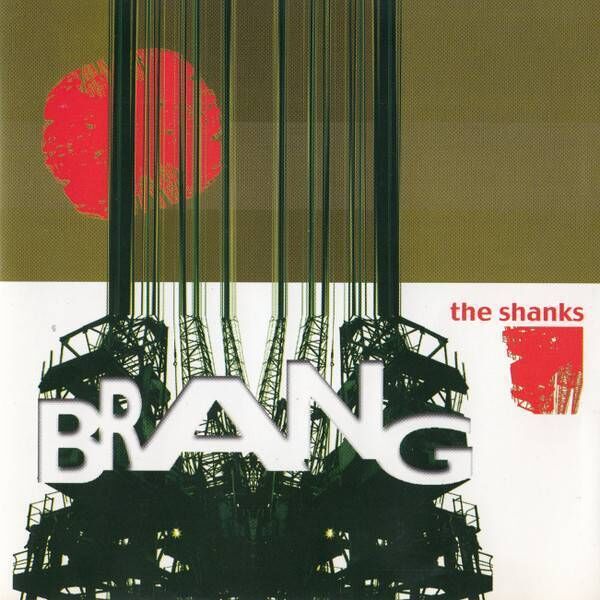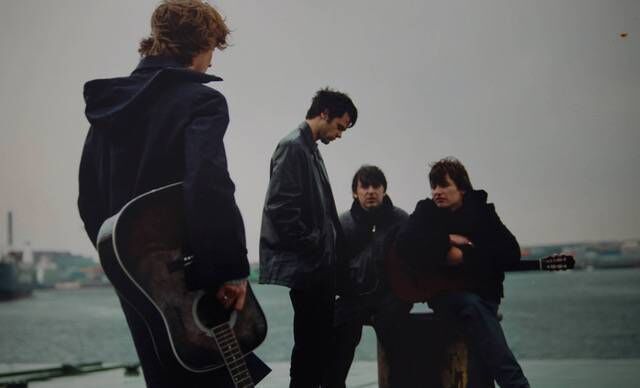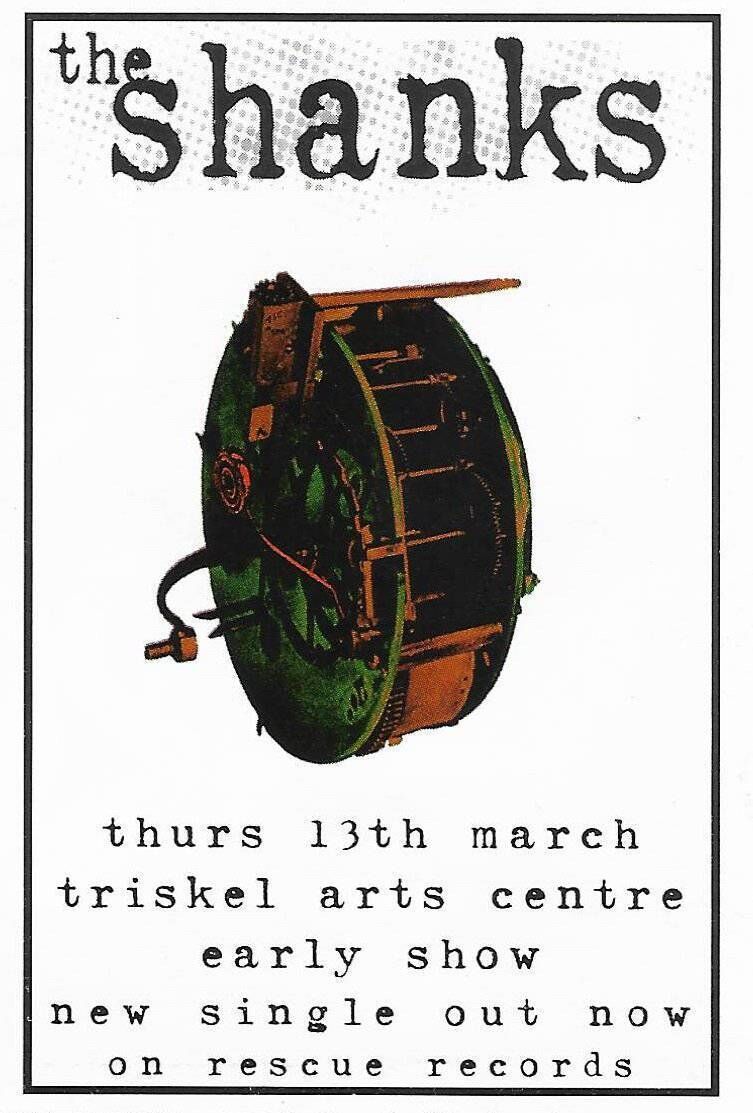Ireland in 50 Albums, No 16: Brang, by The Shanks (1999)

The Shanks: Niall Lynch, Mick Hayes, Eoin 'Stan' O'Sullivan
In 1995 while The Shanks were touring in Germany, guitarist and vocalist Eoin ‘Stan’ O’Sullivan spotted one of their posters outside a venue. “A promoter had taken it upon himself to put a slogan under our poster and he had written ‘FolkenPunkenPop’. It was perfect,” recalls O’Sullivan. “We were like a punk band who had folky songs with the odd catchy chorus.”
The perfect recorded distillation of ‘FolkenPunkenPop’ is the band’s second album Brang. It’s the album wherein all of the Cork band’s disparate influences – indie and punk rock, Irish folk and traditional, and experimental noise rock – gloriously fuse. The Shanks had promised so much for so long and on Brang it all came together magnificently. It was also the end of a ten-year journey for the band and they broke up months after its release.
“I was in The Shanks from the age of 15 to 26. It was a long time. We were living in each other’s pockets,” says O’Sullivan. “By the time we were ready, we were finished, we were burnt out. We'd been doing it for too long.” Upon its release in 1999 the NME declared that, “Brang, in effect, is a re-assemblage of songs heard on John Peel’s ‘Festive 50’ skewed into something that you could almost define as a unique sound.”
That sound is bound up in their North Cork background. The Shanks were from Newmarket and when O’Sullivan, along with bandmates, bassist and vocalist Mick Hayes and drummer Niall Lynch, were teenagers they spent most weekends in Newmarket’s Hiland Ballroom witnessing triumphant gigs by the Golden Horde, A House and others.
They’d listen to classic-rock cover bands and traditional Irish music sessions in the local pubs; the music of Sliabh Luachra was everywhere. The Shanks had a simpler term than their German promoter for this cauldron of sound: “Brang was the imaginary style of music that The Shanks had invented ourselves,” says O’Sullivan.
“The Shanks,” wrote the NME, “are like Gastr Del Sol [David Grubbs and Jim O’Rourke’s Chicago avant-rock band] with a Chieftains fixation.” It’s a description that pleases O’Sullivan: “I always hoped that I was pushing the experiences I had growing up with Irish traditional music and I was hoping that that was coming out in our music.”

When The Shanks moved to Cork in 1991 the city had never heard anything quite like them. The confidence of their playing was down to the years the teenagers had already spent gigging in North Cork and Kerry. “A major plus point for the band was that when they arrived on the Cork scene in 1991 they were the outsiders,” recalls Jim Clancy, The Shanks’ manager.
“What really prepared The Shanks was the boot camp gigging that was the Abbey Inn in Tralee. Those gigs were three hours long. I always thought of The Shanks at the Abbey Inn in Tralee as our version of The Beatles at the Star-Club in Hamburg.” The Shanks had timed their move to the city perfectly. “We hit the Cork scene at a brilliant time, The Sultans of Ping were just on the edge of doing really well, and The Frank & Walters had started to do really well,” says O’Sullivan.
“When we supported The Sultans on a UK tour they were No. 1 in the Indie Charts, which was mind-blowing. We were playing to packed venues.” The Shanks released their debut album The Prawn Lawn in 1994. It’s a good album that was recorded by the late Paddy McNichol in Connolly’s of Leap, his famed West Cork music venue. The album has an earthiness and an innocence about it but ultimately only begged the question: what could The Shanks do with a bigger budget in a proper recording studio?
The next few years were spent gigging from Dingle to Dresden. “We would have thought nothing of traveling for days to play to two people and a dog,” says drummer Lynch.
“We'd go to Europe for a couple of weeks at a time, we'd play all over Holland and Germany, it was all a big adventure,” recalls O’Sullivan.
“The Shanks were a band that gave it their all, we never gave up,” says Hayes. “We were one of the hardest working bands ever and one of the luckiest bands to have a 110% committed manager - the legendary Jim Clancy.”

After years of hustling, Clancy eventually secured a deal. Pearse Gilmore ran Xeric Studios in Limerick; he had managed The Cranberries and had produced and released their earliest recordings. In 1998 he signed The Shanks to his Murgatroid label. By this stage Donagh O'Shea had joined on keyboards. “He was very musical and he gave us a bit of a shaking,” says O’Sullivan.
“He made us think a bit more about what we were doing.” “We were confident going in to record Brang,” remembers Lynch. “We knew we had the songs and we knew we put the hard work in. There was also excitement of going to a ‘real’ studio, and I think that comes across in the sound of the album. There was also a good bit of experimenting going on.”
Singles ‘Trouble’ and ‘Babbling’ are indie bangers but it’s on album tracks such as ‘Two Dogs’ and ‘Crystal Clear’ where the real magic is to be heard. “I played the cello on it, Donagh played prepared piano, where you attack the piano strings,” remembers O’Sullivan. “Mick played an Aboriginal bullroarer, it's a piece of wood on a string and it makes wind sounds. It was also the first time I tried recording fiddle too.
“There's a couple of tracks on that album, that I think are real works of art for myself and the lads. I think it's our best work, it's the most creative and it’s definitely our best album.”

A few months after Brang’s release The Shanks returned to Connolly’s of Leap on New Year’s Eve 1999 for one last gig. “Brang was kind of the twilight of The Shanks but who knows what might have happened had we hung on a bit longer,” says Hayes. “Maybe we were a little over infatuated with absurdity but we very much wanted to be original and not sound like anyone else and I suppose to that extent we were successful.”
“We went from being best friends to wanting to kill each other,” recalls O’Sullivan. “It was only afterwards I realised just how much I loved the lads. We shared so much stuff, it's hard to put it into words.”
Lynch agrees, “We were great friends from the same town, and we’re still great friends today.”
Eoin Stan O’Sullivan formed Stanley Super 800 and released two albums including Choice Music Prize 2007 nominee Louder & Clearer. He releases traditional music through his Sliabh Luachra Records label.
Mick Hayes and Niall Lynch formed the indie/punk band Rulers of the Planet and released two albums. Hayes, now based in the US, records and performs with his partner Clancy Potts as StayStillPills, their album The Palace of Wisdom is coming soon.
James Clancy is a photographer based in Austria. He has exhibited his fine art photography in galleries all across Europe.
- Brang is available on Bandcamp: https://acoustianity.bandcamp.com/album/brang
- Paul McDermott’s podcast To Here Knows When – Great Irish Albums Revisited is available on all listening platforms.


